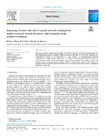Imparting ultralow lubricity to double-network hydrogels by surface-initiated controlled radical polymerization under ambient conditions

Open access
Datum
2021-06Typ
- Journal Article
Abstract
Hydrogels, especially double-network hydrogels, are attractive candidates as load-bearing biomaterials, e.g., tissue-engineering supports for articular cartilages and bones. In this study, we describe the modification of a double-network hydrogel by the introduction of a third monomer, N-[3-(dimethylamino)propyl]methacrylamide, to the network system, which serves as a reactive site for subsequent interfacial reactions and surface-initiated controlled radical polymerization under ambient conditions. The as-prepared poly(2-(methacryloyloxy)ethyl trimethylammonium chloride) (PMETAC) polyelectrolyte polymer brush-modified DN hydrogel exhibited an ultralow coefficient of friction (0.001–0.004) under high contact pressure—comparable to that of the synovial joint. Mehr anzeigen
Persistenter Link
https://doi.org/10.3929/ethz-b-000472074Publikationsstatus
publishedExterne Links
Zeitschrift / Serie
BiotribologyBand
Seiten / Artikelnummer
Verlag
ElsevierThema
Double-network hydrogels; Interfacial reactions; Surface-initiated polymerization; Surface modification; Polymer brushesOrganisationseinheit
03389 - Spencer, Nicholas (emeritus) / Spencer, Nicholas (emeritus)
Förderung
669562 - Polymer Analogs to Biolubrication Systems: Novel materials for exploring cartilage tribology and exploiting its mechanisms (EC)




